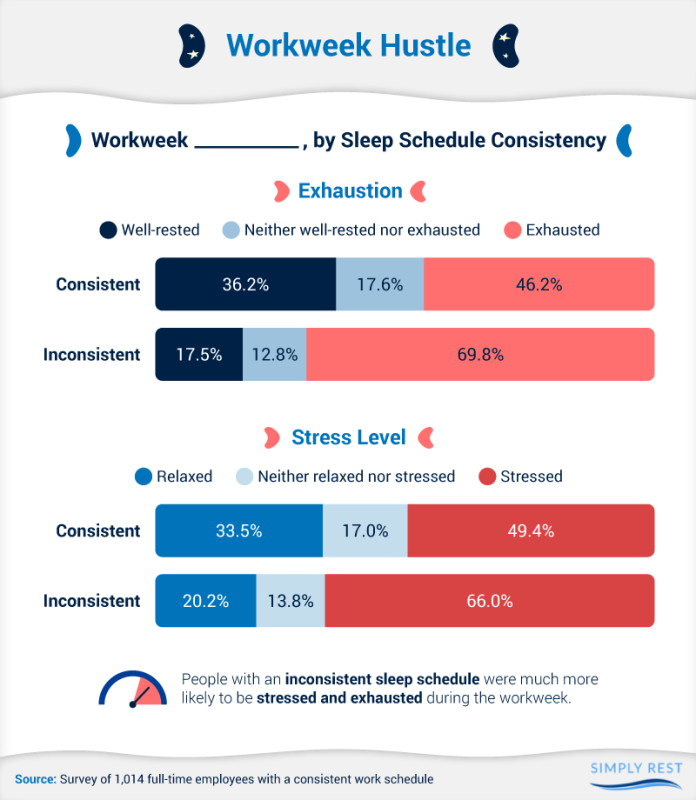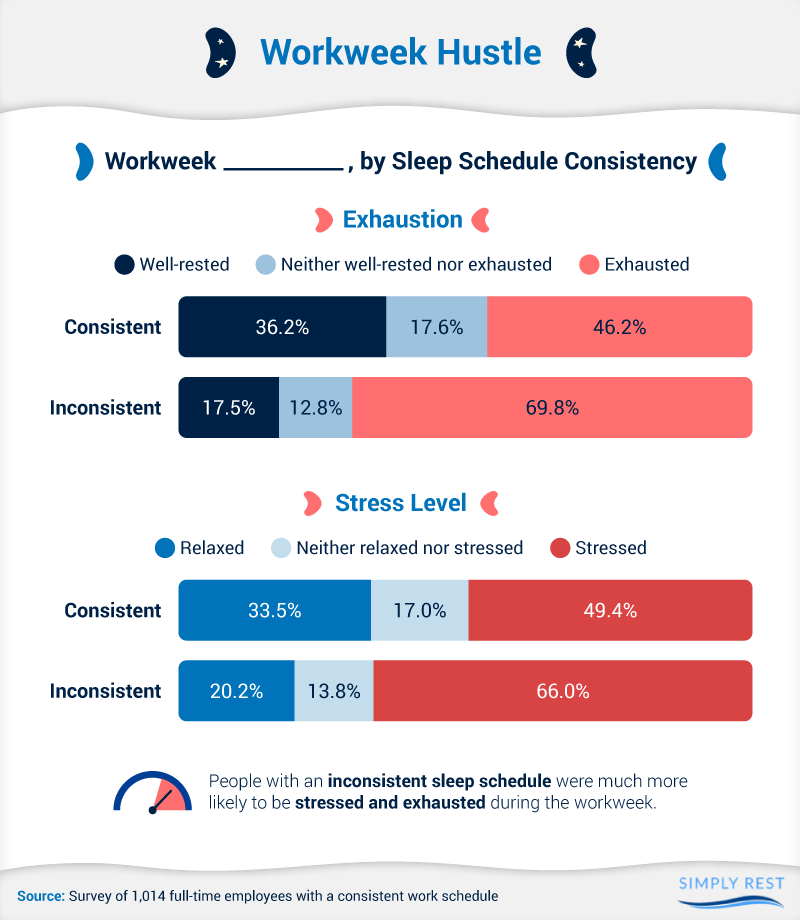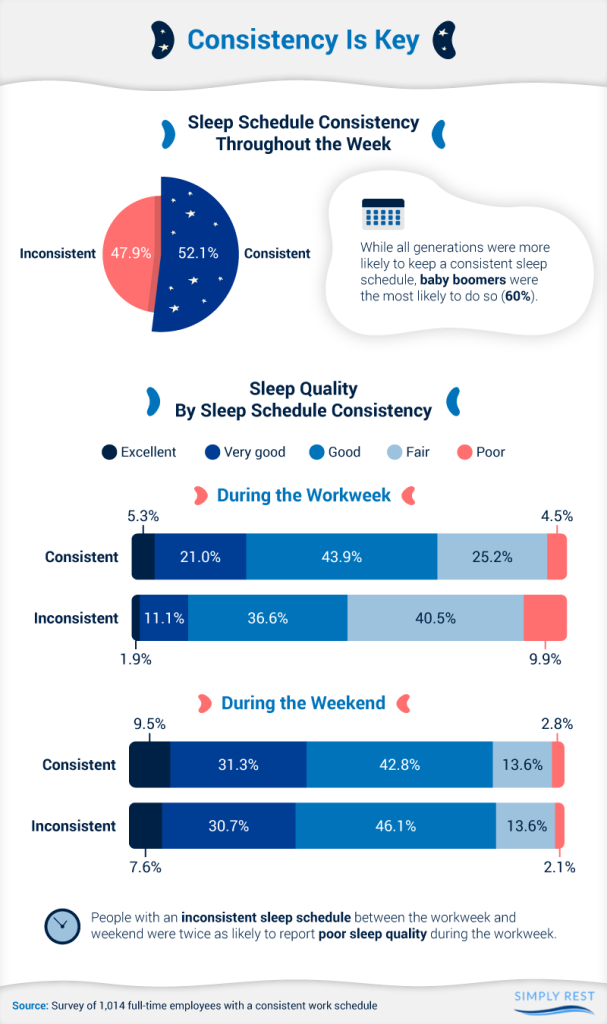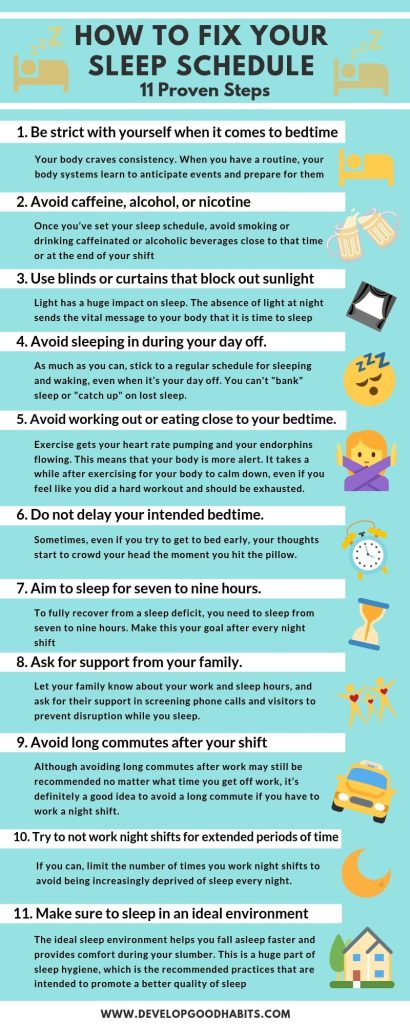Are you tired of tossing and turning at night, struggling to fall asleep? Do you wake up groggy and exhausted, lacking the energy to tackle the day ahead?
If you can relate to these struggles, you’re not alone. Establishing a consistent sleep schedule is essential for maintaining optimal health and well-being.
This article will explore practical tips and strategies to help you establish a consistent sleep routine, allowing you to wake up feeling rested and refreshed each morning.
Say goodbye to sleepless nights and hello to a rejuvenating slumber!
Review contents
1. Understand the Importance of a Consistent Sleep Schedule
1.1 The Benefits of a Consistent Sleep Schedule
A consistent sleep schedule has numerous benefits for your overall health and well-being. When you establish a regular sleep routine, you train your body to follow a natural sleep-wake cycle. This helps regulate your internal clock, also known as the circadian rhythm, which is responsible for maintaining optimal sleep patterns.
A consistent sleep schedule allows your body to experience the appropriate amount of restorative sleep, which is crucial for physical and mental health. It enhances your cognitive function, memory retention, and concentration levels. It also boosts your immune system, promotes a healthy metabolism, and supports proper hormone regulation.
Maintaining a regular sleep schedule can improve your mood, reduce stress levels, and enhance your overall quality of life. By consistently prioritizing sleep, you are laying the foundation for improved productivity, better emotional well-being, and increased energy levels throughout the day.
1.2 The Consequences of an Irregular Sleep Schedule
On the other hand, an irregular sleep schedule can negatively affect your health and daily functioning. Constantly shifting your sleep patterns disrupts your circadian rhythm and throws off the delicate balance of your body’s internal clock.
Irregular sleep patterns can lead to various issues, such as difficulty falling asleep, staying asleep, or waking up feeling refreshed. This can result in daytime sleepiness, fatigue, decreased cognitive performance, and poor concentration. It may also contribute to mood swings, irritability, and a higher susceptibility to stress.
Moreover, inconsistent sleep schedules can have long-term effects on your physical health. Research has linked irregular sleep patterns to an increased risk of developing chronic conditions such as obesity, diabetes, cardiovascular disease, and even certain types of cancer. It can also harm your mental health, increasing the likelihood of developing anxiety and depression.
2. Set a Regular Bedtime
2.1 Determine Your Ideal Bedtime
To establish a consistent sleep schedule, it is crucial to determine your ideal bedtime. This is when you should aim to go to bed each night to ensure you get enough sleep to wake up feeling refreshed and energized.
To determine your ideal bedtime, consider the amount of sleep you need based on age. Generally, adults require about 7-9 hours of sleep each night. Experiment with different bedtimes and pay attention to how you feel upon waking.
Gradually adjust your bedtime until you find the time that allows you to wake up feeling well-rested.
2.2 Gradually Adjust Your Bedtime
If your current bedtime significantly differs from your ideal bedtime, it’s important to make gradual adjustments. Suddenly shifting your bedtime by a few hours can be challenging for your body to adapt to, leading to difficulty falling or staying asleep.
Instead, aim to shift your bedtime by 15 minutes every few nights until you reach your ideal bedtime. This gradual adjustment allows your body to acclimate to the new schedule more efficiently and increases the likelihood of successful implementation.
2.3 Stick to Your Bedtime on Weekends
Consistency is vital when establishing a sleep schedule, so it’s essential to stick to your bedtime, even on weekends. While staying up late or sleeping in on your days off may be tempting, doing so can disrupt your sleep routine and make it harder to maintain a consistent weekly schedule.
If you have social commitments or late-night events on weekends, plan accordingly and adjust your evening routine to accommodate your desired bedtime. By prioritizing your sleep routine, you can reap the benefits of a consistent schedule and maintain optimal sleep quality.
3. Create a Pre-Sleep Routine
3.1 Wind Down Your Mind and Body
Creating a pre-sleep routine is essential in preparing your mind and body for a restful night’s sleep. Like a warm-up before exercise, a winding-down routine signals your brain that it’s time to relax and prepare for sleep.
Consider incorporating activities that help you de-stress and unwind, such as reading a book, taking a warm bath, or practicing relaxation techniques like deep breathing or meditation. Engaging in these activities signals to your body that it’s time to transition from wakefulness to sleep, making it easier to fall and stay asleep throughout the night.
3.2 Avoid Electronic Devices
One of the main culprits contributing to sleep disturbances is using electronic devices before bed. The blue light emitted by smartphones, tablets, and computers can interfere with your body’s natural production of melatonin, a hormone that regulates sleep.
To establish a consistent sleep schedule, avoiding electronic devices at least one hour before bed is important. Instead, replace screen time with activities like reading a physical book, engaging in light stretching, or enjoying a calming cup of herbal tea. By eliminating electronic devices from your bedtime routine, you allow your brain to unwind and prepare for a restful night’s sleep.
3.3 Engage in Relaxation Activities
In addition to avoiding electronic devices, incorporating relaxation activities into your pre-sleep routine can further enhance your ability to fall asleep and stay asleep. Experiment with different methods to find what works best for you.
Consider practicing gentle yoga or progressive muscle relaxation to release any tension or physical stress accumulated throughout the day. Another effective relaxation technique is writing in a gratitude or journaling notebook, reflecting on positive experiences, or jotting down any worries or thoughts that may keep you awake. This practice can help declutter your mind and promote a sense of calm before bedtime.
4. Develop Sleep-Inducing Habits
4.1 Create a Sleep-Friendly Environment
The environment in which you sleep plays a significant role in the quality of your sleep. Creating a sleep-friendly environment that promotes relaxation and comfort can contribute to a consistent sleep schedule.
Ensure that your bedroom is quiet, dark, and free from distractions. Consider investing in blackout curtains, earplugs, or a white noise machine to block out external noise and light. Remove any electronic devices or sources of potential disturbances to create a calm and soothing atmosphere.
Additionally, invest in comfortable mattresses, pillows, and bedding that support your ideal sleeping position. Experiment with different firmness levels and materials to find what suits your preferences and provides the best sleep experience.
4.2 Maintain a Comfortable Temperature
Temperature also plays a crucial role in promoting quality sleep. The ideal sleeping temperature varies slightly from person to person, but it generally falls between 60-67 degrees Fahrenheit (15-19 degrees Celsius).
Experiment with your thermostat settings to find the temperature that allows you to sleep comfortably throughout the night without feeling too hot or cold. Consider using breathable, moisture-wicking bedding materials that help regulate your body temperature and prevent overheating or chills.
4.3 Use White Noise or Sound Machines
Incorporating white noise or sound machines can effectively promote a more peaceful sleep environment if you find it challenging to fall asleep or stay asleep due to external noises or a busy mind.
White noise, such as the sound of rainfall or a fan, can help mask intrusive noises and create a consistent background sound conducive to sleep. Sound machines offer a variety of soothing sounds to choose from, allowing you to find the one that helps you relax and drift off to sleep.
5. Avoid Stimulants and Napping
5.1 Limit Caffeine and Nicotine Consumption
Stimulants like caffeine and nicotine can significantly interfere with sleep quality and disrupt your sleep schedule. To establish and maintain a consistent sleep routine, limiting your consumption of these substances, especially in the evening, is essential.
Avoid caffeinated beverages, such as coffee, tea, or soda, within six hours of your intended bedtime. This allows enough time for the stimulating effects of caffeine to wear off and reduces the likelihood of it interfering with your ability to fall asleep.
Similarly, nicotine is a stimulant that can disrupt your sleep cycle and make it harder to fall and stay asleep. If you are a smoker, consider quitting altogether, but at the very least, avoid smoking in the evening or close to your bedtime.
5.2 Restrict Daytime Napping
While a short power nap can boost energy levels and improve alertness, excessive or poorly timed napping can interfere with your sleep schedule. If you find it difficult to fall asleep at your desired bedtime, restricting or eliminating daytime napping may be helpful.
If you frequently need to nap during the day, limit your naps to 20-30 minutes and schedule them earlier in the afternoon. This prevents your nap from interfering with your circadian rhythm and allows you to maintain a consistent sleep schedule.
5.3 Be Mindful of Alcohol and Heavy Meals
Although alcohol is known to induce drowsiness and may help you fall asleep faster, it disrupts your sleep quality. It can interfere with the normal sleep cycle, leading to fragmented and less restorative sleep.
To establish a consistent sleep schedule, it’s best to avoid consuming alcohol within three hours of bedtime. If you choose to drink alcohol, do so in moderation and be mindful of its potential effects on your sleep quality.
Similarly, eating heavy or spicy meals close to bedtime can cause discomfort, indigestion, or heartburn, making it difficult to fall asleep or stay asleep. Aim to have dinner at least two to three hours before bed for proper digestion and a comfortable sleep experience.
6. Establish a Consistent Wake-Up Time
6.1 Determine Your Optimal Wake-Up Time
Just like determining your ideal bedtime, it’s essential to establish a consistent wake-up time. Your wake-up time sets the rhythm for your day and helps regulate your body’s internal clock.
Consider when you need to wake up to accommodate your daily responsibilities and allow enough time for your desired morning routine. Aim to wake up simultaneously every day, even on weekends, to maintain a consistent sleep schedule.
6.2 Gradually Adjust Your Wake-Up Time
If your current wake-up time drastically differs from your ideal one, it’s best to make gradual adjustments to avoid shocking your body. Like adjusting your bedtime, shift your wake-up time by 15 minutes every few days until you reach your desired wake-up time.
Gradually adjusting your wake-up time allows your body to adapt and reset its internal clock to the new schedule. This increases the likelihood of waking up feeling refreshed and energized.
6.3 Resist the Urge to Sleep In
While hitting the snooze button and catching a few extra minutes of sleep may be tempting, doing so can disrupt your sleep schedule and make it harder to wake up energized.
Resist the urge to sleep in and establish a consistent wake-up time that you adhere to every day, even on weekends. Consistency in your wake-up time helps regulate your circadian rhythm and promotes healthier sleep patterns.
7. Manage Stress and Anxiety
7.1 Practice Stress Reduction Techniques
Stress and anxiety can significantly impact your sleep quality and consistency. To establish a consistent sleep schedule, it’s essential to prioritize stress management and practice relaxation techniques.
Experiment with different stress reduction techniques to find what works best for you. This may include deep breathing exercises, mindfulness meditation, yoga, or hobbies that promote relaxation and provide an outlet for stress.
By incorporating stress reduction techniques into your daily routine, you create a calmer mental and emotional state, making it easier to fall asleep and maintain a consistent sleep schedule.
7.2 Create a Worry Journal
Consider creating a worry journal if racing thoughts keep you awake at night. This involves setting aside a few minutes before bed to write down any worries, concerns, or thoughts that may keep you awake.
Writing in a worry journal helps externalize your thoughts and allows you to release them instead of carrying them to bed. It can provide relief and calmness, preventing excessive rumination and promoting a more peaceful sleep.
7.3 Seek Professional Help if Necessary
If stress and anxiety persist despite your best efforts to manage them, it is essential to seek professional help. A mental health professional can provide guidance, support, and techniques tailored to your needs.
They can help identify and address underlying issues contributing to your sleep difficulties. With their expertise, you can develop strategies for stress management and find effective ways to establish and maintain a consistent sleep schedule.
8. Use Sleep Tracking Apps or Devices
8.1 Utilize Sleep Monitoring Apps
Sleep tracking apps can be valuable tools in helping you establish and maintain a consistent sleep schedule. These apps monitor your sleep patterns, duration, and quality, providing insights into your sleep habits.
By utilizing these apps, you can track your progress and identify areas for improvement. Many sleep-tracking apps also offer features such as sleep soundscapes or guided meditations to help you relax before bed and optimize your sleep quality.
8.2 Consider Sleep Tracking Devices
In addition to sleep-tracking apps, sleep-tracking devices can provide even more detailed data and insights into your sleep patterns. These devices, such as smartwatches or fitness trackers, monitor your sleep stages, heart rate, and movement during the night.
Consider investing in a sleep-tracking device if you are particularly interested in obtaining comprehensive data on your sleep quality. This information can help you identify any disruptions or patterns impacting your sleep and make informed adjustments to improve sleep consistency.
8.3 Analyze Sleep Data for Improvements
Once you have accumulated sleep data from apps or devices, it’s crucial to analyze the information to identify areas for improvement. Look for patterns, such as consistent disturbances during certain times of the night or prolonged periods of wakefulness.
Use this data to gain insights into your sleep habits and adjust your sleep routine. By leveraging sleep-tracking apps or devices, you can actively work towards establishing a consistent sleep schedule and improving your overall sleep quality.
9. Implement Consistency in Daily Routine
9.1 Establish Regular Meal Times
Consistency extends beyond sleep and into other aspects of your daily routine, such as meal times. Maintaining regular meal times helps regulate your body’s internal clock and supports your circadian rhythm.
Establish stable meal times and aim to eat at similar times each day. This promotes better digestion, aids in maintaining a consistent sleep schedule, and supports overall health and well-being.
9.2 Exercise Regularly
Regular exercise is beneficial for your physical health and plays a significant role in improving sleep quality and establishing a consistent sleep schedule.
Engage in moderate-intensity aerobic exercise for at least 30 minutes most days of the week. However, try to finish your workout a few hours before bedtime to let your body wind down and prepare for sleep.
9.3 Avoid Unnecessary Changes to Daily Habits
To establish a consistent sleep schedule, avoiding unnecessary changes to your daily habits is essential. Your body thrives on routine and stability, so maintain a consistent schedule for waking, eating, exercising, and winding down.
While it’s natural for occasional changes or disruptions, try to minimize them as much as possible. Minimizing changes to your routine gives your body a sense of predictability, enabling it to regulate your sleep-wake cycle better.
10. Make Sleep a Priority
10.1 Educate Yourself on the Importance of Sleep
To establish and maintain a consistent sleep schedule, it’s crucial to understand the importance of sleep and its impact on your overall health and well-being.
Educate yourself on the benefits of quality sleep and the consequences of sleep deprivation. By understanding the significance of sleep, you are more likely to prioritize it and make necessary adjustments to your lifestyle to ensure consistent and restful sleep.
10.2 Plan Your Day According to Your Sleep Needs
Once you understand the importance of sleep, prioritize it when planning your daily activities. Consider the recommended amount of sleep for your age group and ensure that you allocate enough time for sleep in your schedule.
Avoid overscheduling yourself or sacrificing sleep for other activities. By dedicating enough time for sleep, you are setting yourself up for a consistent sleep schedule and improved overall well-being.
10.3 Seek Support and Encouragement
Establishing and maintaining a consistent sleep schedule can sometimes be challenging, especially when faced with external factors or busy lifestyles. Seek support and encouragement from friends, family, or online sleep communities.
Joining sleep-related forums or connecting with others with similar sleep goals can provide motivation, accountability, and helpful tips. By sharing experiences and challenges, you can find encouragement and increase the likelihood of successfully establishing a consistent sleep schedule.
In conclusion, establishing a consistent sleep schedule is crucial for your overall health, well-being, and daily functioning.
By understanding the benefits of consistent sleep, setting regular bedtimes and wake-up times, creating a pre-sleep routine, and incorporating sleep-inducing habits, you can optimize your sleep quality and consistency.
Managing stress, utilizing sleep-tracking apps or devices, implementing consistency in your daily routine, and prioritizing sleep all contribute to maintaining a consistent sleep schedule.
Remember that consistency and prioritization are essential to achieving a restful and consistent sleep pattern. So start implementing these strategies, seek support if needed, and prioritize sleep in your daily life. Sweet dreams!































